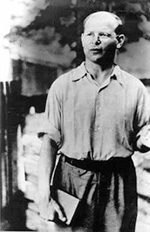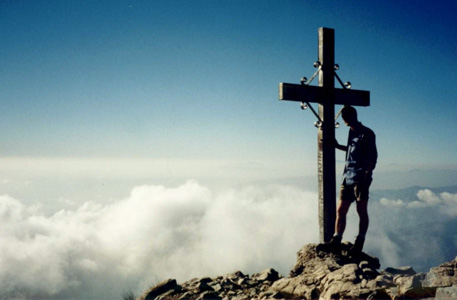Baptized
into Christ Jesus.
by Dietrich Bonhoeffer (1906-1945)
The cross to which we are called is our
daily dying in the power of the death
accomplished by Christ The Christ who
is present with us is the Christ to whom the
whole of Scripture testifies. He is the
incarnate, crucified, risen, and glorified
Christ; and he encounters us in his word.
The different terminology with which the
Synoptic Gospels and Paul communicate this
message does not undermine the unity of the
scriptural testimony.
What the Synoptics [Matthew, Mark,and Luke]
describe as hearing and following the call
to discipleship, Paul expresses with the
concept of baptism. Baptism is not something
we offer to God [See Luke 9:57]. It is,
rather, something Jesus Christ offers to us.
It is grounded solely in the will of Jesus
Christ, as expressed in his gracious call.
Baptism is essentially a paradoxically
passive action; it means being baptized,
suffering Christ’s call. In baptism we
become Christ’s possession. The name of
Jesus Christ is spoken over baptismal
candidates, they gain a share in that name;
they are baptized “into Jesus Christ” (Rom.
6:3; Gal. 3:27; Matt. 28:19). They now
belong to Jesus Christ. Having been rescued
from the rule of this world, they now have
become Christ’s own.
Baptism thus implies a break. Christ invades
the realm of Satan and lays hold of those
who belong to him, thereby creating his
church-community. Past and present are thus
torn asunder. The old has passed away,
everything has become new [2 Corinthians
5:17]. The break does not come about by our
breaking our chains out of an unquenchable
thirst to see our life and all things
ordered in a new and free way. Long ago,
Christ himself had already brought about
that break. In baptism this break now also
takes effect in my own life. I am deprived
of my immediate relationship to the given
realities of the world, since Christ the
mediator and Lord has stepped in between me
and the world. Those who are baptized no
longer belong to the world, no longer serve
the world, and are no longer subject to it.
They belong to Christ alone, and relate to
the world only through Christ.
The break with the world is absolute. It
requires and causes our death [Mark 10:39;
Luke 12:50]. In baptism we die together with
our old world. This death must be understood
in the strictest sense as an event that is
suffered. It is not as if we were asked to
bring about this death ourselves through
various kinds of sacrifice and renunciation.
That would be an impossible attempt. Such a
death would never be the death of the old
self which Christ demands. The old self
cannot kill itself. It cannot will its own
death. We die in Christ alone; we die
through Christ and with Christ. Christ is
our death. It is for the sake of community
with Christ, and only in that community,
that we die. In baptism we receive both
community with Christ and our death as a
gift of grace.
This death is a gift of grace which we can
never create for ourselves. True, in this
death judgment is passed on the old self and
its sin. But out of this judgment rises the
new self which has died to the world and to
sin.
…Christ’s death and cross were cruel and
hard; however, because of our community with
him, the yoke of our cross is easy and
light. The cross of Christ is the gracious
death, which we die once and for all in our
baptism; the cross to which we are called is
our daily dying in the power of the death
accomplished by Christ. Baptism thus means
to be received into the community of the
cross of Jesus Christ (Rom. 6:3ff.; Col.
2:12). The believer is placed under the
cross of Christ.
See related articles:
Excerpt from the Introduction to
Discipleship by
Dietrich Bonhoeffer, originally published in
German by Christian Kaiser Verlag in 1937.
Original, abridged English-language edition
of Nachfolge (Discipleship)
published in 1949 as The Cost of
Discipleship by SCM Press Ltd.,
London, and the Macmillan Company, New York.
Revised, unabridged edition of The Cost
of Discipleship published in 1959 by
SCM Press Ltd., London, and the Macmillan
Company, New York. New English-language
translation of Nachfolge (Discipleship)
with new supplementary
material first published in 2001 by Fortress
Press, Minneapolis, as part of Dietrich
Bonhoeffer Works, Vol. 4. English
translation by Barbara Green and Reinhard
Krauss.
 Dietrich Bonhoeffer
(1906-1945) was a German Lutheran pastor and
a founding member of the Confessing Church.
He was the first of the German theologians
to speak out clearly against the persecution
of the Jews and the evils of the Nazi
ideology. In spring of 1935 Dietrich
Bonhoeffer was called by the Confessing
Church in Germany to take charge of an
“illegal,” underground seminary at
Finkenwalde, Germany (now Poland). He served
as pastor, administrator, and teacher there
until the seminary was closed down by
Hitler's Gestapo in September,1937. Dietrich Bonhoeffer
(1906-1945) was a German Lutheran pastor and
a founding member of the Confessing Church.
He was the first of the German theologians
to speak out clearly against the persecution
of the Jews and the evils of the Nazi
ideology. In spring of 1935 Dietrich
Bonhoeffer was called by the Confessing
Church in Germany to take charge of an
“illegal,” underground seminary at
Finkenwalde, Germany (now Poland). He served
as pastor, administrator, and teacher there
until the seminary was closed down by
Hitler's Gestapo in September,1937.
In the seminary at
Finkenwalde Bonhoeffer taught the importance
of shared life together as disciples of
Christ. He was convinced that the renewal of
the church would depend upon recovering the
biblical understanding of the communal
practices of Christian obedience and shared
life. This is where true formation of
discipleship could best flourish and mature.
Bonhoeffer’s teaching led
to the formation of a community house for
the seminarians to help them enter into and
learn the practical disciplines of the
Christian faith in community. In 1937
Bonhoeffer completed two books, Life
Together and The Cost of
Discipleship. They were first
published in German in 1939. Both books
encompass Bonhoeffer’s theological
understanding of what it means to live as a
Christian community in the Body of Christ.
He was arrested and
imprisoned by the Gestapo in April 1943. On
April 8, 1945 he was hanged as a traitor in
the Flossenburg concentration camp. As he
left his cell on his way to execution he
said to his companion, "This is the end –
but for me, the beginning of life."
photo of Bonhoeffer in the courtyard of
Tegel prison, summer 1944; source:
Christian Kaiser Verlag
|

